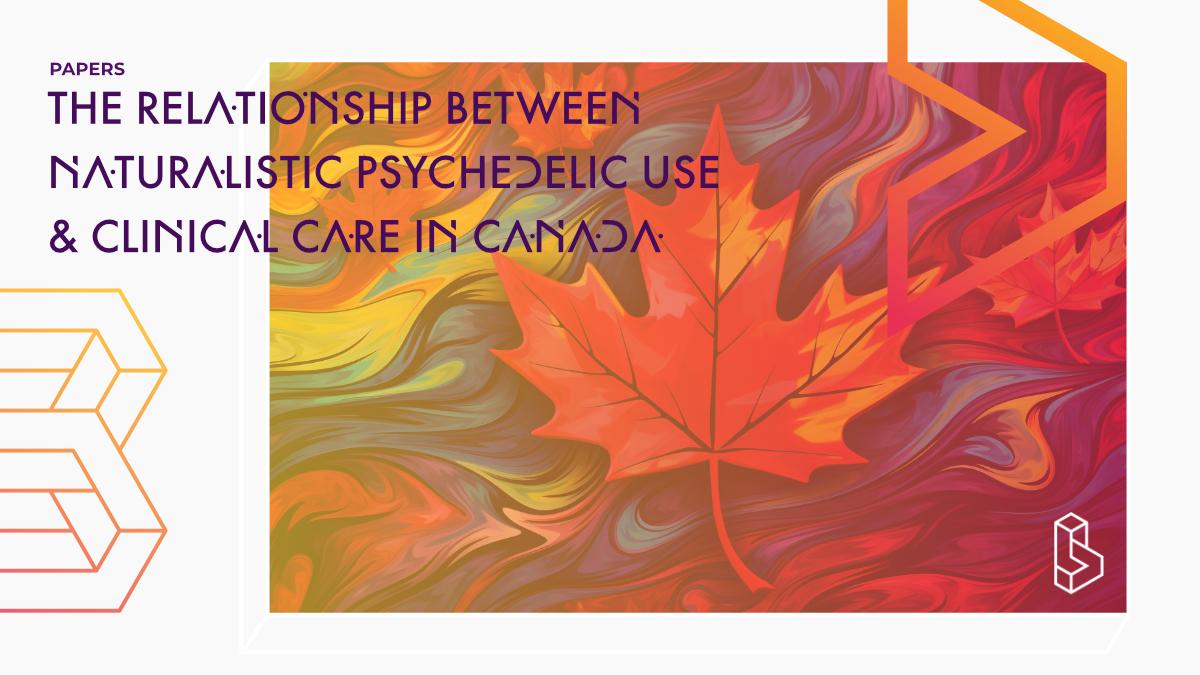This survey (n=2384) of Canadian adults reporting past use of psychedelics assesses health outcomes and integration of psychedelic use with health care providers (HCP). It finds that about 80% never discussed psychedelic use with their HCP, 34% used psychedelics to self-treat a health condition, 45% were aware of substance testing services, and 42% had used them. The study concludes that naturalistic psychedelic use in Canada often includes therapeutic goals but is poorly connected to conventional healthcare, with substance testing being uncommon, and highlights the need for relevant training and education for HCPs, along with more visible options for substance testing.
Abstract of The Relationship Between Naturalistic Psychedelic Use and Clinical Care in Canada
“Naturalistic psychedelic use among Canadians is common. However, interactions about psychedelic use between patients and clinicians in Canada remain unclear. Via an anonymous survey, we assessed health outcomes and integration of psychedelic use with health care providers (HCP) among Canadian adults reporting past use of a psychedelic. The survey included 2,384 participants, and most (81.2%) never discussed psychedelic use with their HCP. While 33.7% used psychedelics to self-treat a health condition, only 4.4% used psychedelics with a therapist and 3.6% in a clinical setting. Overall, 44.8% (n = 806) of participants were aware of substance testing services, but only 42.4% ever used them. Multivariate regressions revealed that therapeutic motivation, higher likelihood of seeking therapist guidance, and non-binary gender identification were significantly associated with higher odds of discussing psychedelics with one’s primary HCP. Having used a greater number of psychedelics, lower age, non-female gender, higher education, and a therapeutic motivation were significantly associated with higher odds of awareness of substance testing. We conclude that naturalistic psychedelic use in Canada often includes therapeutic goals but is poorly connected to conventional healthcare, and substance testing is uncommon. Relevant training and education for HCPs is needed, along with more visible options for substance testing.”
Authors: Nicolas G. Glynos, Daniel J. Kruger, Nicholas Kolbman, Kevin Boehnke, & Philippe Lucas
Summary of The Relationship Between Naturalistic Psychedelic Use and Clinical Care in Canada
The last decade has increased interest in psychedelic substances in conjunction with psychedelic-assisted psychotherapy as possible treatments for neuropsychiatric conditions and substance-use disorders. Indeed, psilocybin-assisted therapy shows potential for treating major depressive disorder, alcohol, and tobacco dependence.
Psychedelic use among adults in North America continues to increase, similar to the increase in cannabis use among Canadians. However, Canadian physicians are not adequately prepared to advise patients on medical cannabis use due to insufficient training in this field.
In tandem with loosening drug policies, psychedelics are increasing in both the U.S. and Canada. Two states and several municipalities have decriminalized psychedelic substances, and several municipalities are considering decriminalization proposals.
Find this paper
The Relationship Between Naturalistic Psychedelic Use and Clinical Care in Canada
https://doi.org/10.1080/02791072.2023.2242353
Paywall | Google Scholar | Backup | 🕊
Cite this paper (APA)
Glynos, N. G., Kruger, D. J., Kolbman, N., Boehnke, K., & Lucas, P. (2023). The Relationship Between Naturalistic Psychedelic Use and Clinical Care in Canada. Journal of Psychoactive Drugs. https://doi.org/10.1080/02791072.2023.2242353
Study details
Topics studied
Population Surveys
Study characteristics
Survey
Participants
2384
Humans

